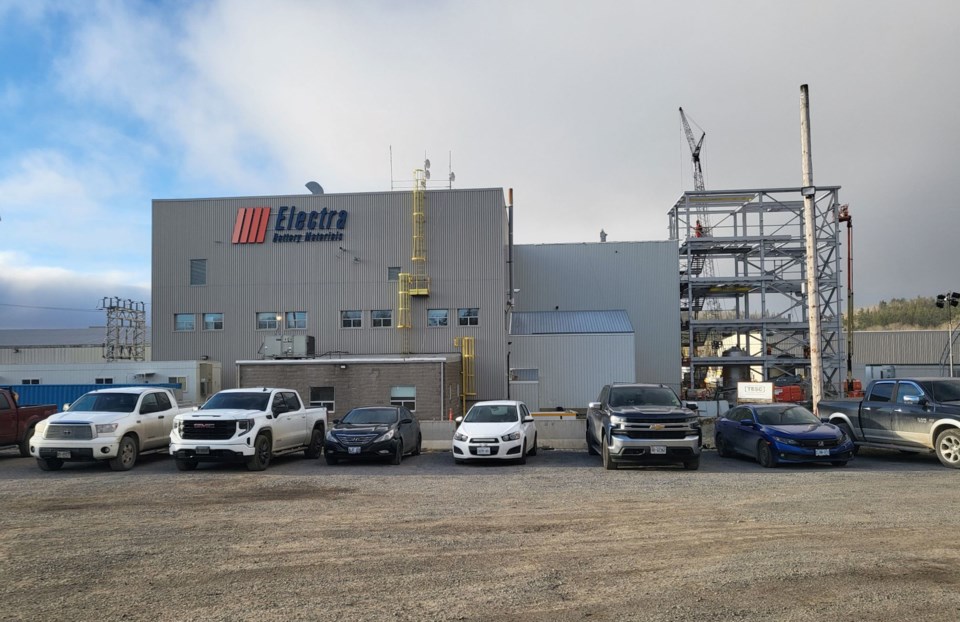February has been a mixed bag of success and headaches for Electra Battery Materials in its redevelopment of a Temiskaming cobalt refinery.
The Toronto company announced it’s achieved a North American first in recovering valuable metals from its ‘black mass’ demonstration plant at the northeastern Ontario site.
But on the flip side, Electra is conducting a project review following some major setbacks, starting with the arrival of a damaged piece of equipment and continuing with problems arising from the global shortage of microchips.
And the company’s timelines to start commissioning the cobalt refinery this spring? Throw that schedule out. Electra said that’s “no longer applicable” with the review is underway on the timing of the refinery startup, capital spending, and planned production of cobalt sulfate.
Electra’s contractors are refurbishing, upgrading and expanding the former Yukon refinery located just outside the town of Cobalt.
Cobalt production and the battery material recycling are part of a sequential build-out toward establishing a one-of-a-kind battery material industrial park by 2026. It would be the first of its kind in North America with Electra’s prime customer base being the Canadian and U.S. electric vehicle industry.
When operational, the plant complex could create between 200 and 300 jobs. Electra’s current project team numbers 31.
Electra explained in a Feb. 14 news released that it recently received a custom-built piece of processing equipment, valued at US$600,000, that was damaged in transit.
The 60-foot-long falling film evaporator vessel is earmarked for use in the refinery’s crystallization circuit, the final stage of the cobalt sulfate refining process. Upon inspection, it was deemed the vessel can be installed but onsite repairs need to be carried out before it can be commissioned.
Adding to Electra’s woes is that the shortage of microchips needed for the refinery’s automated process control systems. This has caused a delay in the delivery of “several” system components.
While progress has been made in construction, Electra said it can only go so far, pending delivery of these components. The refinery is at the 90 to 95 per cent completion mark in procurement, detailed engineering and construction of a new solvent extraction plant.
A company spokesperson said the supply chain disruptions could result in a halt in construction at some point but the timing of such a decision isn't clear.
In light of these issues, Electra said the baseline review will cover the refinery project scope, scheduling and capital expenditures.
Results will be out in the coming weeks, said Electra CEO Trent Mell in a statement.
“Ongoing global supply chain disruptions, notably with microchips needed for monitoring equipment performance and the flow of cobalt solution through various vessels, coupled with the receipt of damaged equipment that is critical to the buildout of the crystallization circuit have created unexpected delays to the commissioning of our cobalt sulfate refinery timelines,” Mell said.
“While we evaluate a number of options, including the procurement of equipment from alternative sources of supply, construction has progressed ahead of equipment deliveries. Site-level leadership is completing a baseline review of the project and the company anticipates providing an update in conjunction with our year-end results to be issued before the end of March.”
On the plus side, Electra said it’s seeing positive results from its black mass trials that Mell said are “extremely encouraging.” Electra has a proprietary hydrometallurgical process it’s began testing at the refinery before Christmas.
.
The company said it was able to recover nickel, cobalt and manganese that originated from shredded lithium-ion batteries. Electra doesn’t actually shred the batteries but buys the powdery black mass from companies that specialize in crushing batteries.
Electra didn’t release any results on the metal recoveries but Mell called the results “validation” for their process. It’s also the first time the once-mothballed refinery has been in production after being idle for a decade.
The trial was set up to process 75 tonnes of black mass with testing ending by the first quarter this year. Electra now said it will extend this testing through to June to generate cash through the sale of multiple products from this material.
The total amount of material to be processed hasn’t been determined. The company said it is in discussions with multiple black mass vendors.
“We have established relations with black mass producers in North America and abroad to support our continued efforts,”said Mell.
Engineering studies will also be done to determine the costs of building a permanent recycling plant next to the existing refinery.
Electra believes this is the first time there’s been recycling of black mass in North America using a plant-scale hydrometallurgical process to manufacture a mixed hydroxide nickel and cobalt product. Competitor companies employ a pyrometallurgical smelting process that has a higher carbon footprint and lower metal recoveries.
Electra also recently raised US$51 million in debt securities, in the form of secured convertible notes, to cover a refinancing and to support its refinery plans. This will repay US$36 million of senior secured notes that were to mature in 2028. The remaining US$14 million will toward the refinery buildings, equipment, infrastructure, engineering and other project management costs.
The company is also in discussions with government seeking $10 million from Ottawa and Queen’s Park to support the refinery startup. The two levels of government had previously committed a combined $10 million toward the project.




